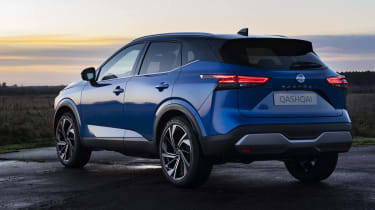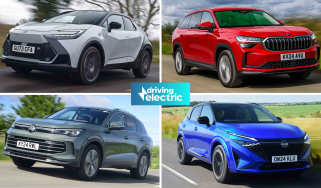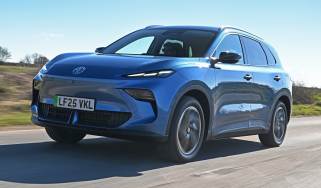2022 Nissan Qashqai hybrid SUV: pictures, details and specs
The latest version of the big-selling family SUV has a sharp new look and hybrid-only engine range – soon to include the unique e-POWER setup
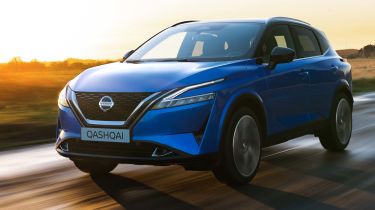
The third-generation Nissan Qashqai SUV will soon be the first model in Europe offered with the brand’s ‘e-POWER’ full-hybrid technology, which can return up to 53mpg while emitting 119g/km of CO2. The Qashqai e-POWER will sit above the existing mild-hybrid petrol engines when it goes on sale in the UK this summer.
The latest Qashqai is also the first Nissan to sit on an all-new platform, named ‘CMF-C’. This has been designed to be lighter and stronger than those of older models, and it’s adaptable, too – Nissan, Renault and Mitsubishi will use it for a range of new electrified hybrid cars.
The major news with this Qashqai is that the big-selling model has dropped purely petrol and diesel engines in favour of a line-up of petrol-electric hybrids. A 1.3-litre DIG-T mild-hybrid petrol setup is offered with a choice of two power outputs, front or four-wheel drive and manual or automatic transmission. Above that is the unique full-hybrid e-POWER setup, which is only available as an automatic with front-wheel drive (more on that below).
A hybrid version of the Nissan Juke will soon be joining the brand’s range of electrified models, along with the pure-electric Nissan Ariya family SUV, the recently refreshed Nissan Leaf family hatchback and the new Nissan Townstar compact electric van. Nissan has confirmed an electric Micra successor is on the way, too.
2022 Nissan Qashqai e-POWER hybrid details
The e-POWER system has already debuted on the Japanese market in models such as the Nissan Note supermini and Nissan Serena MPV, but the new Qashqai will be the first in Europe to be fitted with this particular full-hybrid powertrain. The e-POWER setup differs from other hybrids (such as those from Toyota and Honda), as the petrol engine doesn't directly drive the wheels. Instead, the wheels are driven by electric motors, which take their power from a battery that is itself charged by the petrol engine.
Nissan says this will make the e-POWER drive like a pure-electric car, with the same instant torque surge from rest but without the need to plug the car in. The engine, meanwhile, operates within an 'optimal range' of revs per minute, which Nissan promises will maximise fuel efficiency while also keeping things quiet and providing "a natural, connected feel during acceleration".
The e-POWER drivetrain will be available in two-wheel-drive form and with an automatic gearbox only. It consists of a 1.5-litre petrol-engine generator, with the wheels being driven by a 188bhp electric motor. Nissan estimates average fuel economy of 53mpg and CO2 emissions of 119g/km, although these figures have yet to be verified in official testing.
It’s a different powertrain to the one in the smaller Nissan Juke Hybrid, which uses a petrol engine and electric motor to power the front wheels. The Juke Hybrid will drive more like a conventional hybrid than an electric car, but the resulting efficiency figures are similar, at 54mpg fuel economy and 118g/km CO2 emissions.
Three driving modes will be available to Qashqai e-POWER drivers: Standard, Sport and Eco. In Standard, the car is said to accelerate strongly, while lifting off produces a regenerative braking effect similar to the 'engine braking' experienced in a normal petrol or diesel car.
Sport offers better acceleration with reduced engine off time, while Eco is a fuel-saving mode that optimises battery management and allows for 'coasting' when cruising at a steady speed. The Qashqai e-POWER also gets something called ‘e-Pedal Step’, which should allow for close to one-pedal driving around town. Having pressed the button on the centre console, releasing the accelerator will slow the car to a crawling speed, but not a complete stop. Nissan says this ensures low-speed manoeuvres are as smooth as possible.
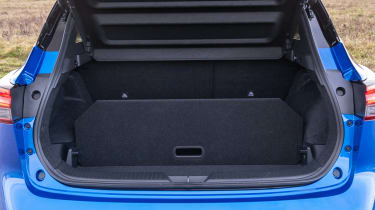
Styling and practicality
The new Qashqai hasn't deviated too much from its predecessor's shape and outline, but boasts a look that Nissan describes as "more muscular, sharp and modern". The front-end treatment is similar to that of the smaller Nissan Juke SUV and forthcoming Nissan Ariya electric car, with a large V-shaped grille and slim, sharp LED daytime running lights.
A single 'fast line' runs down the side of the body, while alloy wheels of up to 20 inches can now be specified – the outgoing Qashqai's wheel range topped out at 19 inches. There's a choice of 11 different body colours, and five two-tone combinations mean a total of 16 variations to pick from.
The wheelbase is 20mm longer than the previous Qashqai's, with the overall length increasing 35mm. The new car is also 25mm taller and 32mm wider than its predecessor. Those increased dimensions pay dividends inside, where Nissan says there's 28mm more kneeroom for rear-seat passengers and 15mm more headroom both front and rear.
A powered hands-free tailgate opens to reveal a boot 50 litres bigger than the previous Qashqai's. Key practicality features from that car, such as side storage compartments and a flexible luggage board system, have been carried over. A wider rear door opening promises easier access for fitting babies and toddlers into child seats.
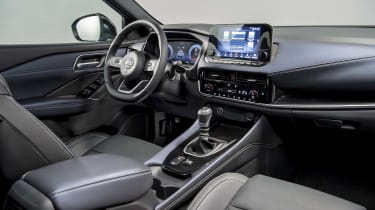
Interior and technology
Inside, the new Qashqai features a straightforward and functional dashboard design, with a 12.3-inch digital dial screen behind the steering wheel, a prominent tablet-style nine-inch infotainment screen in the middle of the dashboard and an upright panel just underneath it incorporating air vents and physical controls for the heating and ventilation system. A 10.8-inch head-up display in the driver's line of sight is also available, along with other luxuries such as a Bose sound system and massaging seats.
White ambient lighting is used throughout and Nissan says that all switchgear and buttons have a "high-quality, tactile feel". On the technology front, the car's infotainment system incorporates smartphone integration, on-board wi-fi for up to seven devices and the NissanConnect app for remote interaction with and monitoring of the car. Google Assistant and Amazon Alexa integration allows routes and destinations to be searched for at home and then sent to the navigation system.
The new Qashqai also features the latest iteration of Nissan's 'ProPILOT' driver assistance technology. This will be capable of accelerating or braking autonomously while staying within a traffic lane and keeping a safe distance from vehicles in front, as well as coming to a stop in heavy traffic and then moving off again if the car is stopped for three seconds or less. The system will also take account of the prevailing speed limit, as well as using sat-nav data to anticipate sharp bends.
Recommended
Most Popular

EV Deal of the Day: Dacia Spring is amazingly good value at £116 per month
